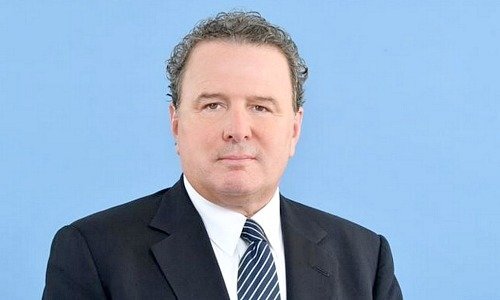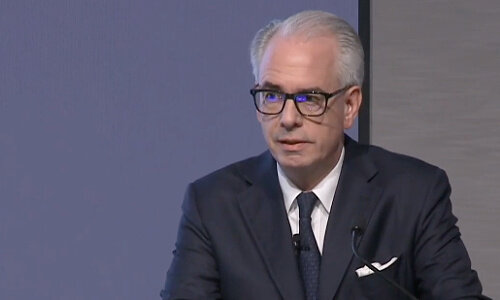The Secret Winner of Credit Suisse's Restructuring
With its reorganization, Credit Suisse has yet to convince markets and investors. Nevertheless, a winner emerges from the ranks of the Swiss bank.
It would be a compliment to say Credit Suisse's eagerly awaited restructuring announcement landed with a thud. Instead, at the close of trading yesterday the bank's share price fell nearly 19 percent. Clearly not the hoped-for effect. Even if this were to turn around, for the time being, it is not just a defeat, but a major disappointment.
Still, one clear winner does emerge from the restructuring effort: Michael Klein (pictured below). The 59-year-old American with his eponymous New York consulting boutique, M Klein & Company has been on the Credit Suisse Board of Directors since April 2018. Until now, he has acted mostly in the background, but this has not detracted from his influence and importance.
«New Credit Suisse»

When he was elected to the bank's supervisory board, people wondered what a US investment banker with a network of contacts in the commodities business was doing on the Credit Suisse board of directors. A Swiss bank that is, after all, dedicated to asset management and sustainability. Klein initiated the talks leading to the merger of Zug-based commodities groups Glencore and Xstrata. Now we know.
As of today, it is clear that Klein is the linchpin of the «New Credit Suisse,» as Chairman Axel Lehmann described the bank on Thursday. Klein is leaving the board to take on top responsibility for the planned investment bank CS First Boston, which will officially begin operations next year.
Ahead of Credit Suisse's announcements yesterday, media reports were swirling it planned to revive the «First Boston» brand as a separate entity.
Favorable Entry Point

Even if Credit Suisse retains the majority of shares in the new entity, it will operate independently within a partner structure and capital markets and advisory bank. That means CS First Boston will have other partners. One such partner, yet to be named, already committed to injecting about $500 million, Credit Suisse Group CEO Ulrich Koerner (pictured above) said Thursday.
It is only natural Klein takes a stake in this institution, following in the former partnership tradition of large US investment banks such as Goldman Sachs and JP Morgan. For Klein, the timing is favorable, because CS First Boston, now with a clear US focus, has no legacy issues, manageable risk-weighted assets of around $20 billion, and a clear focus on individual lines of business. Under these conditions, it has a relatively high chance of success. It could be floated on the stock market at some point, which in turn would help Credit Suisse reap a big profit.
No Casino Culture
As a mere shareholder instead of a parent company, Credit Suisse will no longer be obliged to compensate for any losses with the income from Swiss asset management. In addition, the partners involved with their own money are likely to be strict in ensuring that no casino culture arises in their ranks, as has recently been the case at Credit Suisse.
Klein emerges as a winner of the latest restructuring in yet another way. He has long-standing connections to the highest authorities in Saudi Arabia, the country whose Saudi National Bank (SNB) will now hold almost ten percent of Credit Suisse as part of a capital increase. If one adds the shares of the long-standing Saudi shareholder family Olayan, investors from Saudi Arabia become the largest shareholder group.
Davos in the Desert
Klein is one of the rare Western financial experts who enjoy the unlimited trust of the Saudi elite under the aegis of crown prince Mohammed bin Salman (MBS), who wants to transform the desert kingdom from oil to a high-tech economy, which he is currently also propagating through the «Davos in the Desert» confab.
It comes as no surprise that Klein is counted as one of the key architects of the partial and highly complex listing of Saudi oil company Saudi Aramco in 2020, which also involved the SNB. The IPO contributed $25.6 billion to the coffers.
One More Rescue
For its part, the SNB stressed on Thursday it could participate in future capital infusions to Credit Suisse in order to develop of its own, independent investment bank kingdom. In that scenario, it is likely that Klein has another golden opportunity.
Klein previously told finews.asia he always stepped aside in the event of conflicts of interest as a member of the Credit Suisse Board of Directors. He already made it clear when he joined the board that he would never become active in an investment banking role. This statement now calls for a clarification: Klein has no active role in Credit Suisse's investment banking. Instead, he has all the more at CS First Boston.




























